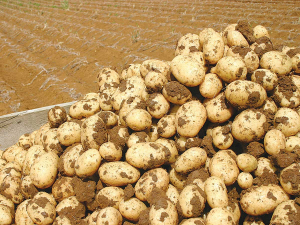Spuds losing ground to housing
Potato growers are losing prime land to urban sprawl, with over 3000ha lost since 2016.
 Potatoes NZ says domestic NZ fresh and frozen fries sales will have been impacted by the closure of hospitality in this Level 3 response in the Auckland region.
Potatoes NZ says domestic NZ fresh and frozen fries sales will have been impacted by the closure of hospitality in this Level 3 response in the Auckland region.
Potato growers say the recent border controls around Auckland affected supply chains and transit for staff living outside the region.
Also, the closure of Auckland fruit and vegetable shops during Level 3 last month led to a food surplus and waste among growers.
Potatoes NZ chief executive Chris Claridge says the industry swiftly adapted to lockdown alert Level 3 in Pukekohe and Level 2 elsewhere, just as they did during the first lockdown earlier this year.
“There have been difficulties, with border controls in Pukekohe/Auckland, which have hindered transit for staff,” he told Hort News.
“Sadly, the Government has again not allowed fresh produce shops to open during Level 3, which has again meant difficulties for supply chains and potentially this sort of thing will lead to food surplus and food waste.
“In saying that, growers have given surplus to food banks and charitable activities as they always do.”
HortNZ’s plea to the Government for fruit and veggie shops to remain open during the Level 3 fell on deaf ears.
In New Zealand there are multiple ways fresh fruit and vegetables are available for sale to the general public. The majority of these sales are made through large supermarket chains and independent fresh fruit and vegetable retailers, at a market share of approximately 80% and 20% respectively. However, in Auckland independent retailers represent 60% of sales of fresh fruit and vegetables.
The closure of Auckland fast food outlets and restaurants also dealt a blow.
Claridge says domestic NZ fresh and frozen fries sales will have been impacted by the closure of hospitality in this Level 3 response in the Auckland region.
“It is too early to see the economic impact on our sales data,” he says.
Claridge expects domestic sales to be affected in the coming months by hospitality activity, business closures and consumer activities.
Evidence of spud dumping
Potatoes NZ has filed a tariff application with the Government for frozen fries imported from Europe.
Potatoes NZ chief executive Chris Claridge says the application was based on evidence.
The tariff application is sitting with Ministry of Business, Innovation and Employment (MBIE) and is under investigation.
“We made the application based on evidence of price and volume dumping from Europe into NZ,” says Claridge.
“We wouldn’t have been able to make the application without evidence, so yes we have seen and collected the evidence.”
Keratin biomaterials company Keraplast and Wools of New Zealand have signed a new superpremium wool contract which is said to deliver a boost to wool growers.
While things are looking positive for the red meat sector in 2026, volatility in global trade remains a concern, says the Meat Industry Association (MIA).
The quest to find innovative practical, scientific solutions to deal with water-related issues at a catchment level has been the theme of an important conference at Massey University last week.
One of the country's top Māori farms faces a long and costly rebuild to get the property back to where it was before recent storms ripped through it.
The latest Global Dairy Trade auction results have delivered a boost to dairy farmers.
New Zealand potato growers are prioritising value creation from high yields to meet a complex mix of challenges and opportunities, says Potatoes NZ chief executive Kate Trufitt.